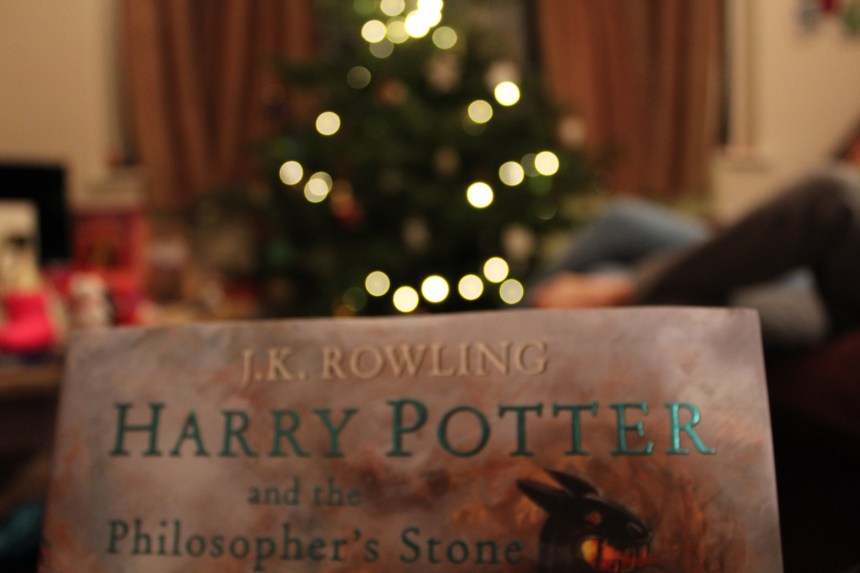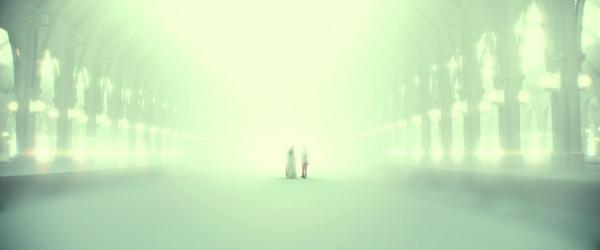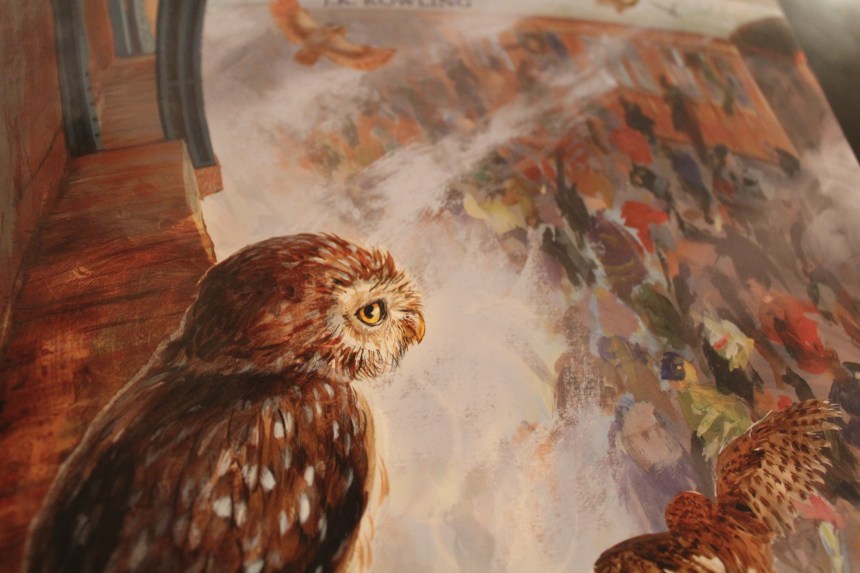
These stories, that were a light to me in times of darkness, a friend in times of loneliness, have been given so much more meaning still, when I read them as a Christian. Yes, Harry Potter is a story about magic, but it is a story about love, sacrifice, life, death, friendship and hope. It is a story that points to Jesus, that is always pointing me to Him.
Biblical imagery is definitely woven into the pages of the Harry Potters books. One blog post about Harry Potter that I read recently subtitled itself ‘There’s little doubt that the Christian tradition informs much of Rowling’s beloved series.’ J.K. Rowling herself said in an interview that ‘There’s a lot of Christian imagery in the books. That’s undeniable. And certainly in Hallows it is very clear’, showing a true intent to reflect the truths of the bible in this inspiring story. In a world of magic and mystery we are given the story of a boy, a boy who humbly takes on the great weight that the wizarding world places upon him, a boy who loves his friends, who longs for a family, a boy who lived, and a boy who is only a boy, but is a boy that points me to Jesus.
It starts with the premise that love can save you from death and ends with a proclamation that sacrifice in the name of love can bring you back from it.
This was said in an MTV article that speaks about the presence of the bible within Harry Potter. Whilst Harry Potter may not give an explicit summary of the gospel, it is clear that, from beginning to end, it is pointing to something bigger than the story of a boy wizard, it is pointing to the very love that is expressed in the good news of what God has done for us.
John 3:16 says:
For God so loves the world that he gave his one and only Son, that whoever believes in him shall not perish but have eternal life.
God’s love is so deep, so vast, that he gave his son in our place, that we might be saved from death. Jesus’ sacrifice for us was so powerful that it brings us back from death. He died in our place, he took on the punishment that we deserve, took on all of our sin, so that we could be forgiven. And through this forgiveness, through this new life, we are given the inheritance that God created for us, we are given the certain hope of heaven. We are brought from death to life, and through the spirit of God we are continually being made new.
Picture
This will undoubtedly be my first of a number of posts about Harry Potter, so I would just like to show you one Christian truth that I think is explored very deeply in the Harry Potter series. In true Harry Potter fashion, I’m going to open at the close. I want to start by looking at the final chapters of Deathly Hallows, because in the actions of Harry, in the task that Harry takes upon himself, I think we see something of Christ’s great sacrifice for us.
I’m about to talk about the end of the book so…
WARNING: SPOILERS
At the close of this wonderful book series we see Harry, the beloved main character walk to his death. When Snape dies, he gives Harry some of his memories. Harry takes these memories to the Pensieve and is thus able to see moments of Snape’s past played out before him. We see. in these memories, the truth of who Snape was, of what he did. And we find out something else too, something that changes the whole story even more. We learn that there is a Horcrux inside of Harry, part of Voldemort’s soul. We know that in order for Voldemort to be defeated all his Horcrux’s must be destroyed and we learn that in order for this Horcrux to be destroyed, Harry must die. Harry must give himself as a sacrifice that others may be free from the oppressive regime of Voldemort.
We watch as Harry, overcome with so many emotions and fears, faces this fate. We watch as he walks into the Forbidden Forest, as, with the resurrection stone, he recalls a memory or shadow of his loved ones that have died, and how, with this strength, he walks towards Voldemort and faces his him. And he doesn’t fight, he doesn’t resist, he lets Voldemort kill him, because he know that this must happen.
Yes, this ending is filled with Horcruxes, hallows, Harry’s family and the resurrection stone. But it is also filled with sacrifice, with humility, with love and with resolution.

And yet Harry doesn’t die. We read as he wakes up in a mysterious place, full of light, heaven-like. We are brought back to the familiar setting of King’s Cross and yet it is made new, made clean, even pure, a new creation?
And we see Dumbledore. There are many things to think about in relation to Dumbledore. But the important thing here is that he died a year before this, and yet Harry is speaking to him… another pointer to heaven, to joy of seeing loved ones again?
And then we find out that Harry has a choice. A choice to go back into the world, or to go ‘on’. And though this place his peaceful, though he is free from the chaos of the battle in the heaven like Kings Cross, he is set on returning, on continuing to fight the battle, that every Horcrux may be destroyed. And he returns to the world. He in, a certain sense, comes back from death, is resurrected to life. And feigning death, he is carried back into the midst of the battle by Hagrid, where he makes his final stand against Voldemort.
Perhaps the differences grow bigger here, but we can’t deny that Harry’s story resembles something of the amazing truth of the gospel within it.

If you’re still with me, I just want to share three ways in which Harry Potter has continued to bring me back to the truth about what Jesus has done for me, and rejoice even more in this good news.
The Willingness of Jesus
When Harry learns the truth of what must be done to defeat Voldemort, he is terrified. Throughout his seven years in the wizarding world he has evaded death so many times, and yet here it stands before him, inescapable. He is overwhelmed by fear and yet he does what he must do, he willingly walks to his death. One blog post describes the conflict in Harry like this:
Rowling’s description of Harry’s walk into the woods juxtaposes Harry’s incredible desire to hold onto life against his determination to face his calling and responsibility.
Again, I recognise that there are many differences, but in the willing sacrifice of Harry in these books we see a shadow of the willing sacrifice of Jesus on the cross. The conflict of Harry I think reflects the call of Jesus in Gethsemane:
‘Abba, Father’, he said, ‘everything is possible for you. Take this cup from me. Yet not what I will, but you will.’ – Mark 14:35
Jesus knew what was ahead of him, he knew that he would face suffering, persecution and death, even death on a cross, but that doesn’t mean that there is no fear. We see here a central theological truth: Jesus is both fully God and fully man. But what does this mean? This means that Jesus is God, that he has the power to overcome sin, overcome death, and to forgive our transgressions against him. It also means that Jesus is a man, God become man, that he can be hurt, can be killed and can feel fear. If Jesus wasn’t fully man, he wouldn’t have been able to die, and if he wasn’t fully God, he wouldn’t have been able to save us through his death.
But in Jesus’ call we see another beautiful truth. We see the willingness of Jesus to act out the loving will of his Father. He asks that, if there be another way, he may be free from what he must face. But he finishes with a willing obedience, a willingness to go to the cross and take on the punishment that we deserve, a willingness to die in our place.
One hymn I love takes the image of the cup and shows us the willingness with which Jesus faced the cross, faced death:
And yet he drank it all, the saviour drank it all. – Gethsemane Hymn
Trusting in the Father
Jesus’ trust in the father is central in following his will, and I think we are shown something of this in Harry’s journey to the Forbidden Forest, in his journey towards his own death. When Harry comes to the edge of the forest, he realises that all along he has been carrying the resurrection stone, one of the deathly hallows, which as its name suggest recalls people from the dead. It does not have the power to raise people from the dead, when Harry sees his love ones they are faint, not part of the world. And yet Harry Speaks to them, and in the simplest of conversations with his father we are reminded somewhat of God’s promise to never leave us, to never forsake us:
‘You’ll stay with me.’
‘Until the very end,’ said James.
But Jesus’ trust, of course, surpasses this. Because whilst Harry feels the presence of his loved ones until the killing curse overcomes him, Jesus experiences what it is like for his Father to turn away. When Jesus dies on the cross he takes on our sin, our shame, our uncleanness, our transgressions, our iniquities. God’s righteous anger for us is placed on His son, and He cannot look upon him.
This is why Jesus calls ‘My God, my God, why have you forsaken me?’ And in this we know that Jesus has really taken upon the wrath reserved for us, that Jesus has faced the rejection that we rightly deserve. This is what was meant to happen. And yet Jesus trusted his Father, even when darkness fell upon the world, even when He turned away, even when he was truly alone. Jesus trusted the will of his father. And he calls us to do so to, knowing that we will never face the same rejection.
Coming down the Mountain
To show you another side of Jesus’ sacrifice that the closing chapters of Harry Potter help me to acknowledge and rejoice in even more, I would like to take you back to an earlier chapter of the gospel of Mark.
Mark 9:2-10 reads:
2After six days Jesus took Peter, James and John with him and led them up a high mountain, where they were all alone. There he was transfigured before them. 3 His clothes became dazzling white, whiter than anyone in the world could bleach them. 4 And there appeared before them Elijah and Moses, who were talking with Jesus. 5 Peter said to Jesus, “Rabbi, it is good for us to be here. Let us put up three shelters—one for you, one for Moses and one for Elijah.” 6 (He did not know what to say, they were so frightened.) 7 Then a cloud appeared and covered them, and a voice came from the cloud: “This is my Son, whom I love. Listen to him!” 8 Suddenly, when they looked around, they no longer saw anyone with them except Jesus.
9 As they were coming down the mountain, Jesus gave them orders not to tell anyone what they had seen until the Son of Man had risen from the dead. 10 They kept the matter to themselves, discussing what “rising from the dead” meant.
Reading Deathly Hallows, I think that Harry’s re-entrance to the battle has really reminded me of this part of the bible. Why? Because of this small yet monumental phrase in verse 9: ‘As they were coming down the mountain…’ Yes, it doesn’t seem very monumental, but let me try and explain it to you through how it has been explained to me.
‘At the top of mountain, Peter, James and John saw a glimpse of Jesus as He truly is. They see this in the astonishing brightness of His appearance, and then through the people who appear. Both Moses and Elijah are Old Testament prophets of monumental greatness. Jesus is in that company, he is the final and greatest prophet. And then we have the voice that comes from the cloud, the voice of God. His key message is to identify Jesus not simply as a prophet but as the very Son of God who must be listened to. It was a life changing moment for these disciples to see the Glory of God on that mountain. And they want to stay there. Peter, in his fears, asks to put up shelters for Jesus and the prophets, he is truly in awe of the glory of Jesus.’
‘But then they came down the mountain. Jesus, the awesome, bright, prophetic Son of God does not choose to hang on to glory. The true miracle here is that He leaves the glory of the mountain, comes down and tells them that He must suffer much and be rejected. Jesus is heading for the cross.’
And that’s what Jesus did when he came to this world, born into a lowly family, born as a vulnerable and dependent baby. He let go of his glory and came right into the midst of the suffering of this world, and ultimately to the cross, ultimately to the place where he would suffer for us, would suffer in our place.

In an article on Christianity Today, Andrew Peterson presents a thank you to J.K. Rowling, a thank you that I would love to say too: ‘I love that your story reminds me that light is stronger than darkness, that the best way to love is to lay your life down, and that death will not have the final say.’
Because this story about a boy wizard and a magical world is always pointing me back to Jesus, back to my saviour, back to my God. ‘I have the freedom to rejoice in the Harry Potter story, because even there, Christ is King.’
And here’s a final thought on how Harry’s death points, again, to Jesus. Perhaps this is a weak connection, but when Harry is killed, the Horcrux inside him was destroyed. When Jesus died on the cross our sin was destroyed. It was taken away. If we trust in Him we are truly forgiven, truly free from sin.
